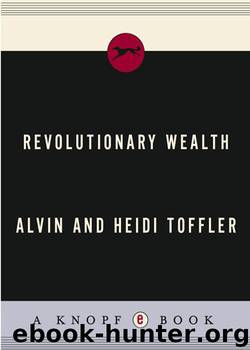Revolutionary Wealth by Alvin Toffler

Author:Alvin Toffler
Language: eng
Format: azw3
ISBN: 9780307265555
Publisher: Knopf Doubleday Publishing Group
Published: 2006-04-25T04:30:00+00:00
CHAPTER 38
CONVERTING CAPITAL
Question: How does an unemployed heating salesman, scraping by in the midst of the greatest economic depression the world has ever seen, become a millionaire?
Answer: By finding a way for millions of others to get rich—with play money in a game called Monopoly.
Since Charles Darrow sold his game to Parker Brothers in 1935, an estimated 500 million people in eighty countries have moved tokens across Monopoly boards printed in twenty-six languages including Czech, Portuguese, Icelandic and Arabic. In playing the game, they were introduced to a white-mustached, tubby figure in top hat and tux, seen hauling a huge sack of money to the nearest bank.
That cartoon figure and the acquisitive nature of the game itself commented wryly on reality in yesterday’s industrial America—a country shaped by the concentrated wealth and power of a few families with names like Morgan, Rockefeller, Carnegie, Harriman, Vanderbilt and Mellon. Pro-business Americans called them captains of industry—the great personages who built the American economy. Anti-business Americans called them robber barons—criminals who bilked, rather than built, the country. The one word on which both sides could agree was capitalist.
During most of the industrial era, capital in the world’s most capitalist country was correctly seen as tightly concentrated. “Before the 1920’s,” writes Ron Chernow in The Death of the Banker, “Wall Street spurned the small investor as too trivial to consider.”
In the mid-1950s, as white-collar and service workers began outnumbering blue-collar workers, about 7 million Americans owned stock. By 1970, the number had soared to 31 million—mostly small accounts, perhaps, but no longer trivial in aggregate. And in the years since then, as the transition to a knowledge economy continued, direct and indirect ownership of financial assets by the public skyrocketed.
Company after company, starting out in private hands, reached out to a broader and broader public for financing. The Ford Motor Company is typical. Wholly owned by Henry and Edsel Ford as of 1919, Ford went public in 1956 and now boasts 950,000 shareowners.
Today, writes veteran business analyst James Flanigan, the owners of America are the “more than 100,000,000 Americans who hold more than $5 trillion worth of company stock through their pension funds, retirement plans and individual retirement accounts.… American workers own more than 60 percent of the stock in all U.S. public companies.” That averages out to $50,000 each, not counting equity in the houses owned by nearly 70 percent of them, plus additional assets in the form of health, life and property insurance.
But these ownership statistics tell only half the story. Americans, including a huge percentage of that 100 million, also carry on their backs, like the capitalist’s money bag, an immense, ever-ballooning burden of household debt that can all too often outweigh these assets.
In 2005, according to the Federal Reserve, U.S. home owners owed $8 trillion on their mortgages. They owed another $2 trillion on their credit cards, car loans and other consumer debt.
Even so, wide distribution of company stock and other assets makes American workers “owners” to a degree unique
Download
This site does not store any files on its server. We only index and link to content provided by other sites. Please contact the content providers to delete copyright contents if any and email us, we'll remove relevant links or contents immediately.
Hit Refresh by Satya Nadella(9132)
The Compound Effect by Darren Hardy(8965)
Change Your Questions, Change Your Life by Marilee Adams(7780)
Nudge - Improving Decisions about Health, Wealth, and Happiness by Thaler Sunstein(7706)
The Black Swan by Nassim Nicholas Taleb(7129)
Deep Work by Cal Newport(7083)
Rich Dad Poor Dad by Robert T. Kiyosaki(6632)
Daring Greatly by Brene Brown(6512)
Principles: Life and Work by Ray Dalio(6446)
Playing to Win_ How Strategy Really Works by A.G. Lafley & Roger L. Martin(6302)
Man-made Catastrophes and Risk Information Concealment by Dmitry Chernov & Didier Sornette(6019)
Big Magic: Creative Living Beyond Fear by Elizabeth Gilbert(5771)
Digital Minimalism by Cal Newport;(5764)
The Myth of the Strong Leader by Archie Brown(5507)
The Slight Edge by Jeff Olson(5417)
Discipline Equals Freedom by Jocko Willink(5389)
The Motivation Myth by Jeff Haden(5212)
The Laws of Human Nature by Robert Greene(5208)
Stone's Rules by Roger Stone(5087)
